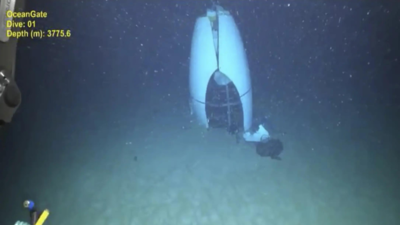- News
- World News
- US News
- 'All good here': Last messages from Titan Submersible revealed before tragic end
Trending
'All good here': Last messages from Titan Submersible revealed before tragic end
Over a year after the Titan submersible's catastrophic implosion killed five passengers, an investigation criticizes OceanGate for prioritizing profits over safety. Testimonies reveal ignored safety warnings and a malfunction before the fatal dive. The incident underscores the dangers of cutting corners in deep-sea exploration near the Titanic wreck site.

(AP photo)
More than a year after the catastrophic implosion of the Titan submersible, which killed all five passengers aboard, the tragedy has taken on the form of a modern-day Greek tale of hubris like Titanic, according to testimony from the first week of US coast guard panel investigating the disaster.
The Washington-based company behind the submersible, OceanGate, and its founder, Stockton Rush, have been criticised for prioritising profits over safety, with passengers paying $250,000 for the doomed dives.
Harvard oceanographer Peter Girguis told CNN, "What this really comes down to is hubris and greed," noting the bitter irony that the disaster took place near the site of another infamous maritime catastrophe — the Titanic.
'Smoke and mirrors': Malfunction days before fatal dive
The crew of five — including Rush, businessman Shahzada Dawood, his son Suleman, businessman Hamish Harding, and French diver Paul-Henri Nargeolet — perished when the submersible imploded on June 18, 2023, shortly after losing contact with its mother ship.
Their remains were identified through DNA analysis, according to the Marine Board of Investigation.
'All good here': Titan's message before implosion
One of the final messages from the Titan, sent just moments before the disaster, read: "All good here." But less than 30 minutes later, contact was lost. As Chris Roman, a professor at the University of Rhode Island, told CNN, cutting corners in deep-sea exploration "will bite you" .
'Catastrophic implosion'
Authorities concluded that the Titan submersible suffered a "catastrophic implosion," a violent collapse triggered by the immense pressure of the deep ocean. Near the wreckage, "presumed human remains" believed to be those of the victims were recovered from the sea floor.
'The old man and the sea'
Until that tragic morning, no manned deep-ocean submersible had ever imploded, according to experts in the industry.
The event echoes the sentiment in Hemingway's "The old man and the sea": “Man is not made for defeat...A man can be destroyed but not defeated.” It serves as a sobering reminder of the relentless power of nature when faced with human ambition.
The Washington-based company behind the submersible, OceanGate, and its founder, Stockton Rush, have been criticised for prioritising profits over safety, with passengers paying $250,000 for the doomed dives.
Harvard oceanographer Peter Girguis told CNN, "What this really comes down to is hubris and greed," noting the bitter irony that the disaster took place near the site of another infamous maritime catastrophe — the Titanic.
'Smoke and mirrors': Malfunction days before fatal dive
During the hearing, former associates of OceanGate described a "smoke and mirrors" culture, revealing that the Titan experienced a malfunction days before the fatal dive. Witnesses also recounted repeated safety warnings that were ignored.
The crew of five — including Rush, businessman Shahzada Dawood, his son Suleman, businessman Hamish Harding, and French diver Paul-Henri Nargeolet — perished when the submersible imploded on June 18, 2023, shortly after losing contact with its mother ship.
Their remains were identified through DNA analysis, according to the Marine Board of Investigation.
'All good here': Titan's message before implosion
One of the final messages from the Titan, sent just moments before the disaster, read: "All good here." But less than 30 minutes later, contact was lost. As Chris Roman, a professor at the University of Rhode Island, told CNN, cutting corners in deep-sea exploration "will bite you" .
'Catastrophic implosion'
Authorities concluded that the Titan submersible suffered a "catastrophic implosion," a violent collapse triggered by the immense pressure of the deep ocean. Near the wreckage, "presumed human remains" believed to be those of the victims were recovered from the sea floor.
'The old man and the sea'
Until that tragic morning, no manned deep-ocean submersible had ever imploded, according to experts in the industry.
The event echoes the sentiment in Hemingway's "The old man and the sea": “Man is not made for defeat...A man can be destroyed but not defeated.” It serves as a sobering reminder of the relentless power of nature when faced with human ambition.
End of Article
FOLLOW US ON SOCIAL MEDIA











